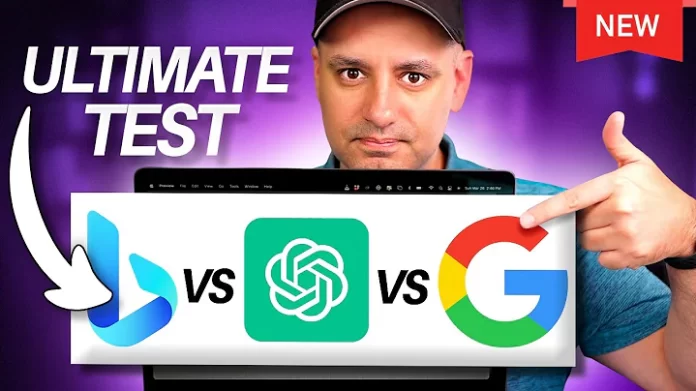Intro
In the rapidly evolving world of artificial intelligence, the battle for supremacy among the top AI assistants—ChatGPT, Bard, and Bing AI—is heating up. This comprehensive AI comparison will delve into the strengths and weaknesses of these AI powerhouses, leaving no stone unturned as we determine which one reigns supreme in the ultimate AI comparison.
Overview
The AI landscape has seen a flurry of activity in recent months, with each major tech company vying for a piece of the pie. ChatGPT, the brainchild of OpenAI, has captured the public’s imagination with its impressive language capabilities. Google’s Bard, a relative newcomer, aims to challenge ChatGPT’s dominance, while Microsoft’s Bing AI, powered by the same underlying language model as ChatGPT, offers a unique twist on the AI assistant experience.
Ease of Use
When it comes to ease of use in this AI comparison, Bard has a distinct advantage. As a product of Google, it seamlessly integrates with the tech giant’s suite of tools, allowing users to access it directly from their Google accounts. This level of integration makes Bard a natural choice for those already immersed in the Google ecosystem. Bing AI, on the other hand, requires a bit more setup, as it is tied to the Microsoft Edge browser. While it does offer a robust mobile app, the initial setup can be a deterrent for some users.
ChatGPT, the free version, is relatively straightforward to access, with a simple sign-up process. However, the paid version, ChatGPT 4 with web browsing, comes with a $20 monthly price tag, which may be a drawback for those seeking a free AI assistant. Additionally, ChatGPT 4 has limitations on the number of prompts it can handle, further complicating the user experience.
Prompts
When it comes to prompts in this AI comparison, each assistant has its own strengths and weaknesses. Bard excels at providing detailed, well-structured responses, often presenting the information in a visually appealing format, such as tables and bullet points. Bing AI, on the other hand, sets itself apart by crediting the sources it uses to generate its responses, adding an extra layer of transparency to the process.
ChatGPT 3.5, the free version, struggles with outdated information, as its knowledge base is limited to 2021. However, ChatGPT 4 with web browsing overcomes this limitation by accessing real-time data, allowing it to provide more up-to-date and relevant information.
Accuracy
Accuracy is a critical factor in this AI comparison. Bard and Bing AI have consistently provided accurate responses, even on complex math problems and queries requiring real-time data. ChatGPT 3.5, the free version, falters in this area, as its outdated knowledge base can lead to inaccurate information.
ChatGPT 4 with web browsing fares better, leveraging its internet access to deliver more accurate and up-to-date responses. However, the tool’s tendency to “hallucinate” or generate plausible-sounding but inaccurate information remains a concern that users should be aware of.
Creative
When it comes to creativity in this AI comparison, ChatGPT 4 emerges as the clear winner. The AI assistant’s ability to generate detailed, cinematic prompts for text-to-image platforms like Midjourney is truly impressive, showcasing a level of creative prowess that Bard and Bing AI struggle to match.
Bard and Bing AI do offer creative capabilities, but they tend to be more formulaic and less nuanced than the responses generated by ChatGPT 4. The latter’s ability to craft unique, imaginative prompts sets it apart as the superior choice for users seeking a creative AI partner.
Speed
In the speed test of this AI comparison, Bard emerges as the clear frontrunner, quickly generating code and providing comprehensive responses in a matter of seconds. ChatGPT 3.5 also performs admirably, delivering solutions in a timely manner, though the free version’s limitations can slow down the process.
Bing AI and ChatGPT 4, on the other hand, lag behind in terms of speed, often taking longer to generate responses, even on relatively simple tasks. This disparity in performance can be a significant factor for users who value quick, efficient assistance.
Conclusion
After a rigorous evaluation across multiple categories, it’s clear that each AI assistant has its own unique strengths and weaknesses in this AI comparison. Bard’s seamless integration with the Google ecosystem, coupled with its impressive performance in areas like prompts and speed, make it a formidable contender. Bing AI’s transparency and Midjourney-focused capabilities also deserve recognition.
However, the overall winner of this AI comparison is ChatGPT 4 with web browsing. While the free version of ChatGPT struggles in certain areas, the paid version’s ability to access real-time data, its unparalleled creative prowess, and its consistent accuracy make it the standout choice for users seeking a comprehensive and capable AI assistant.
As the AI landscape continues to evolve, it’s essential to stay informed and keep an eye on the latest developments. To ensure you’re always up-to-date with the best AI tools and resources, be sure to check out Skill Leap AI – the ultimate AI learning platform.




